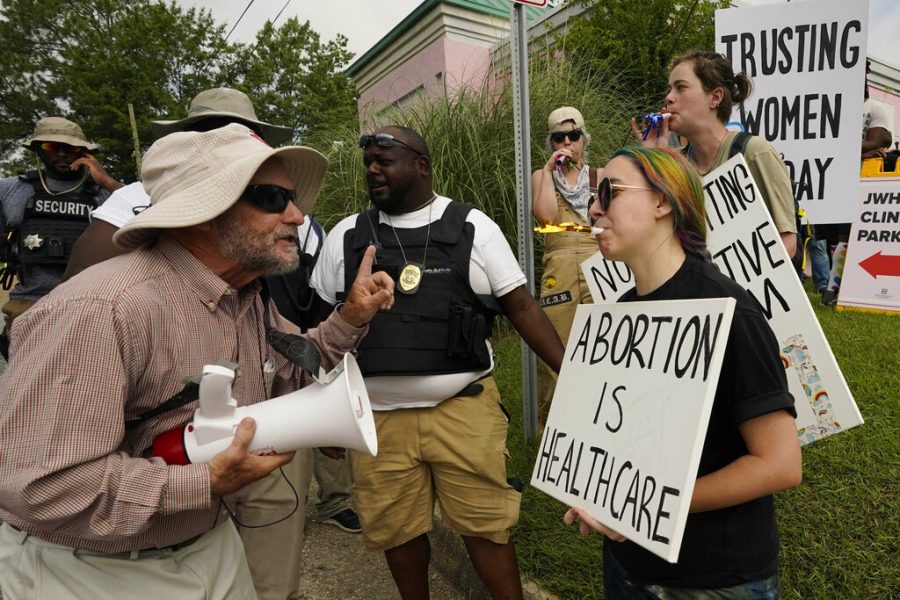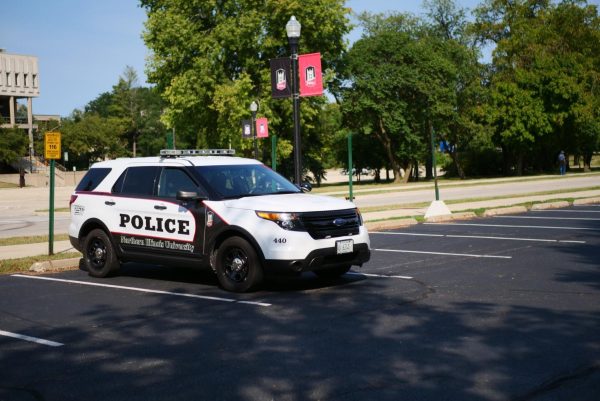NIU community: Overturn of Roe v. Wade is a step backward
Rogelio V. Solis | Associated Press
A Mississippi clinic security officer (right) attempts to keep anti-abortion activist Doug Lane (left) from a physical confrontation with sign carrying abortion rights supporters. The clinic will close after the state law banning abortions take effect Thursday. (Rogelio V. Solis | Associated Press)
DeKALB — People with uteruses in the NIU community share their thoughts on the June 24 ruling by the Supreme Court to overturn Roe v. Wade and how it will affect people, especially those who live in states where abortions will now be illegal.
The Supreme Court made its original decision on Roe v. Wade in 1973, which made abortions legal nationwide.
‘A step backward’
Honor Morgan, a senior political science major, said she is a strong advocate for reproductive rights and that she has been influenced by posts she has seen on social media.
“It’s a little scary when other states around me are looking at prohibiting the certain birth control methods I use,” Morgan said.
Morgan said she has seen posts on Instagram where doctors are stepping back from performing the surgeries needed to save the mother’s life during a life-threatening birth.
For example, Dr. Jessica Rubino works at Austin Women’s Health Center in Texas. Rubino said she will no longer provide abortions for fear of legal action, according to an article from NBC News. Rubino had to turn away a patient with kidney failure and try to help the patient be able to get an abortion in a different state.
Morgan said NIU needs to support students, especially those from out of state during this time.
“I think as long as we keep supporting students’ right to choose, as well as providing resources to access healthcare that’s necessary that might not be available in their home state, I think we’d be doing a really good job of supporting our student body,” Morgan said.
Morgan said her parents are from England and she has family living abroad, so she gets to hear firsthand how physicians in other countries want to expand abortion access to U.S. citizens.
For example, a physician group in the United Kingdom has called for free abortions in that nation for Americans who can’t access them, according to an article from The Guardian.
Morgan said that it’s sad that other countries feel they have to discuss stepping up and trying to provide resources that citizens of the United States can’t receive in their own home.
‘Horrifying’ and ‘gruesome’
Associate communication professor Kathryn Cady primarily focuses her research on the representations of women in the labor market and teaches communication and gender, which centers around feminist theory within communication studies.
Cady said she has always been interested in women’s rights.
“The overturn of Roe versus Wade is horrifying,” Cady said. “For my whole life and longer than that, women have been able to make important decisions about their own reproductive health care themselves, and the Supreme Court has said that women don’t deserve that right.”
Making abortions illegal will have negative consequences for financial and medical reasons because women will perform abortions in unsafe ways just like they did before Roe v. Wade was established, Cady said.
“Women would perforate their uteruses with foreign objects, they would throw themselves down the stairs in hopes of getting a miscarriage, they would ingest bleach or Lysol and get sepsis,” Cady said. “I mean, it was, you know, not just unsafe, but really gruesome.”
Cady said women have to make the decision about whether they can afford to have another child or any children at all, or they might choose to have an abortion because they are in a relationship that is unfit for parenting a child.
‘Taking away healthcare’
Sarah Biernat, a senior human development and family science major, said she felt scared and livid immediately after learning Roe v. Wade was overturned. Now she said she feels numb amid the flood of information.
“I’m grateful that I live in Illinois,” Biernat said. “I was born and raised here and so as far as I’m aware, we will continue to be a blue state which means that we will have access to abortion.”
Biernat said she is petrified that not every state bordering Illinois has those rights since some of them were trigger law states.
Trigger laws are laws passed that will be enforced either immediately or soon thereafter the precedent law is overturned. Trigger laws were in place in 13 states before June 24: Arkansas, Idaho, Kentucky, Louisiana, Mississippi, Missouri, North Dakota, Oklahoma, South Dakota, Tennessee, Texas, Utah and Wyoming.
Biernat said that people should recognize that abortion is healthcare.
“When you strip people of their rights to get an abortion, you’re taking away healthcare,” Biernat said.
The future of abortion laws in the United States remains up in the air, but Biernat believes NIU can help students by providing sex education resources. For example, NIU can provide condoms in places where students frequent, set up workshops or seminars with the Center for the Study of Women, Gender and Sexuality and offer courses regarding prenatal and human development for all students.
“Doing little things like leaving condoms in areas where it’s highly populated, it would slowly start to almost decriminalize sex and make it less taboo because, at the end of the day, pregnancy isn’t something that we need to talk lightly about,” Biernat said.











